|
This is my dynamic, frequently updated homepage. This is a NewsLog, also known as a WebLog or Blog.
Everything is evolving, so don't assume too much.
People to watch:
Adina Levin
Andrius Kulikauskas
Britt Blaser
Catherine Austin Fitts
Chris Corrigan
Clay Shirky
Dan Gillmor
Dave Pollard
David Allen
David Weinberger
Dewayne Mikkelson
Dina Mehta
Doc Searls
Elisabet Sahtouris
Elizabeth Lawley
Euan Semple
Florian Brody
Frank Patrick
Gen Kenai
George Dafermos
George Por
Graham Hancock
Greg Elin
Hazel Henderson
Heiner Benking
Inspector Lohman
Jean Houston
Jerry Michalski
Jim McGee
Jim Moore
John Abbe
John Perry Barlow
John Robb
Joi Ito
Jon Husband
Jon Lebkowsky
Jon Udell
Jonathan Peterson
Judith Meskill
Julian Elvé
Julie Solheim
Kevin Marks
Lawrence Lessig
Leif Smith
Letecia Layson
Lilia Efimova
Lisa Rein
Marc Canter
Mark Oeltjenbruns
Mark Pilgrim
Mark Woods
Martin Dugage
Martin Roell
Mary Forest
Matt Mower
Max Sandor
Michael Fagan
Mike Owens
Mikel Maron
Mitch Kapor
Mitch Ratcliffe
Nathalie dArbeloff
Netron
Noam Chomsky
Paul Hughes
Peter Kaminski
Phil Wolff
Philippe Beaudoin
Ray Ozzie
Raymond Powers
Rebecca Blood
Roger Eaton
Roland Tanglao
Ross Mayfield
Scott Lemon
Sebastian Fiedler
Sebastien Paquet
Skip Lancaster
Spike Hall
Steven Johnson
Stuart Henshall
Thomas Burg
Thomas Madsen-Mygdal
Thomas Nicholls
Timothy Wilken
Todd Suomela
Tom Atlee
Tom Munnecke
Tom Tomorrow
Ton Zijlstra
Lionel Bruel
Loic Le Meur
Nancy White
Mark Frazier
Merlin Silk
Robert Paterson
Colby Stuart
Nova Spivack
Dan Brickley
Ariane Kiss
Vanessa Miemis
Bernd Nurnberger
Sites to watch:
Edge
Junto
Absara
Rhizome
Nanodot
HeadMap
Openworld
FutureHi
Imaginify
Do No Harm
BoingBoing
Smart Mobs
Webcamorama
MetaFilter
NotThisBody
Disinfopedia
YES Magazine
Collective Web
WorldChanging
Disinformation
Escape Velocity
Space Collective
Friendly Favors
Emergent by Design
Independent Media
Global Ideas Bank
Forbidden Science
Greater Democracy
ThoughtsOnThinking
Disclosure Project
Explorers Foundation
Manufacturing Dissent
Collective Intelligence
Action without borders
Free Expression Network
Co-intelligence Institute
Electronic Frontier Foundation
French:
Emmanuelle
Manur
Elanceur
Loeil de Mouche
IokanaaN
Blog d'Or
Le Petit Calepin
GeeBlog
Absara
Guillaume Beuvelot
Ming Chau
Serge Levan
Jean Michel Billaut
C'est pas Mécanique

I live in Toulouse, France where the time now is:
01:06
Unique Readers:

Primarily
Public Domain
Everything I've written here is dedicated to the
Public Domain.

The quotes from other people's writings, and the pictures used might or might not be copyrighted, but are considered fair use. Thus, overall, this weblog could best be described as being:
Primarily Public Domain. |
Syndication:
 ![Validate my RSS feed [Valid RSS]](http://www.newciv.org/pic/valid-rss.png)
|
| Tuesday, April 20, 2004 |  |
|
|
|
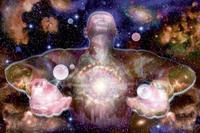 Paul Hughes makes a compelling case for free will as an unavoidable constant, tying into and going beyond neuroscience, quantum mechanics, and many other subjects. Article "Super Free Will: Metaprogramming & Quantum Uncertainty" at FutureHi. Paul Hughes makes a compelling case for free will as an unavoidable constant, tying into and going beyond neuroscience, quantum mechanics, and many other subjects. Article "Super Free Will: Metaprogramming & Quantum Uncertainty" at FutureHi.
Neuroscientists and behavioral scientists and cognitive researchers can show how most of our behaviors and thoughts can be shaped or controlled by chemistry and by the inputs we are provided. By finding the right place to put electrodes on someone's brain, or by setting up an environment that influences them in a particular way, one can shape people's reality, and the throughts and feelings they have, to a remarkable extent.
The funny thing is that eastern mystics and yogis and meditators might say similar things, from another angle. Most of what you do is just robotic, arbitrary behavior patterns that you do completely automatically, based on what has been imprinted and conditioned into you. You walk around, half-asleep, in an arbitrary world that is projected for you, having thoughts and feelings that mostly aren't your own.Ok, so where does free-will come in? So far it seems like I’ve decimated every last shred of free-will and human dignity. Yes, and for good reason! Unless we understand the full extent of just how brainwashed and programmed we are, we will never have anything close to a free-will. To be free it first helps to intimately understand just how imprisoned we are by our own nervous system. Freedom comes from knowledge, not ignorance. To know thyself is the pathway to liberation and freedom, as I will now explain. No matter what we do, we're mostly dealing with a world that comes in through our perceptions and our nervous systems, and before we even get around to having a thought about something, we're already many levels of abstraction removed from the real event. And when we form ideas and concepts and try to share them with each other, they're all subject to the same limitations. Even scientists are thoroughly conditioned into logical fallacies developing from layers upon layers of fuzzy abstractions and semantic and neurological limitations.
The answer is that the only thing that leads out of the trap is consciousness that includes knowledge of all these limitations and that strives to transcend them.
Quantum mechanics entails that any measurement includes uncertainty. Even if you check it with another measurement, it just involves more uncertainty. Ad infinitum. The only thing that breaks the chain is when a conscious observer decides what it means.
Likewise, no matter how mired we are in uncertainty and subsconscious conditioning from our environment, we can always move a step up. We can encompass all the uncertainty, including our own imperfect perceptions and memories, and aim at getting what the meta-program is. We can increase our freedom and free will and awareness by understanding better how things work, and by transcending the previous limits we experienced. If we don't add in our own consciousness, we'd keep going in circles. But by becoming conscious of a new understanding, which provides more choices and more freedom, we can actually move up in the spiral. And we can repeat that any number of times. Finding how our previous beliefs and behavior patterns limited us, and moving on to a meta-understanding of them, which gives us more flexibility. But which, of course, again becomes a limitation sooner or later, which we need to transcend. All of this includes, of course, not just how we think, but how capable we are at working with our environment.So here we are altering our own molecular DNA, and soon the entire physical world down to the atomic level. Another way of looking at this, is DNA having evolved out of the slime, is now becoming recursive enough to begin altering itself with internationality and purpose towards something stronger, smarter and more versatile. Going further, the atomic world is now becoming aware of itself, and as it becomes aware of these limits, just like we becoming aware of our own programming, will begin to re-program this matter to become more expressive to this internationality, to the logos, the memeplex that is our noosphere. Will this self-recursion ever end? Probably not. Do we have free will? As I have shown, free-will is a matter of degree. It is easily demonstrated that we can increase the levels and degrees of freedom as we become aware of our own limits. I would say, not only is there free-will, but eventually everything in the universe, including the very essence of ourselves will become re-defined by it. In the end, everything will change, but one thing will remain and increase, the level of our free will, our consciousness, the fundamental that is and comprises everything. As Paul says, free will not only exists, but ultimately it is all that remains in an ever changing uncertain universe. And I agree. For that matter, it seems abundantly logical to me that the universe and our existence in it makes no sense without the perpetual existence of consciousness. I.e. being aware of something and being able to make a choice about it. That can happen at very low levels, automatically and imperfectly, or it we can strive towards doing it better, gaining more all-encompassing wholistic knowledge, understanding ourselves and the universe better, and doing more interesting things with that new awareness.
[ Knowledge | 2004-04-20 05:49 | | PermaLink ] More >
|
|
| Monday, April 19, 2004 |  |
|
|
|
 Via Local Thoughts, a little creative exercise: Via Local Thoughts, a little creative exercise:1. Grab the nearest book
2. Open the book on page 23.
3. Find the fifth sentence.
4. Post the text of the sentence in your journal along with these instructions.
The nearest book I grabbed blindly from the shelf was the Webster's College Dictionary. Now, I'm not sure if in this case I should pick literally the 5th sentence or the 5th word defined. But, magically, they're talking about the same thing. 5th sentence is part of the definition of "affluence":a flowing to or toward some point; afflux. And the 5th word defined is "afflux", which means:1. something that flows to or toward a point, e.g. "an afflux of blood to the head". 2. the act of flowing to or toward some point. So, afflux or affluence is when something flows towards a point. If you want an affluence of something, you need to make it flow towards a point. That's sort of simple and basic, but a very useful thing to pay attention to. If I want an affluence of money, money needs to be flowing towards a point, such as my bank account.
[ Inspiration | 2004-04-19 12:25 | | PermaLink ] More >
|
|
|
|
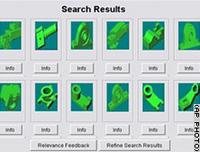 CNN mentions researchers working on making a search engine that can search for pictures that are similar to something you're looking for. More impressively, they can do that with 3D objects too. CNN mentions researchers working on making a search engine that can search for pictures that are similar to something you're looking for. More impressively, they can do that with 3D objects too.Draw a big potato, and the system responds with a bunch of, well, potato-looking objects -- and a few urns. Those seem wrong until you rotate your potato, orienting it vertically instead of horizontally, and see your sketch actually does resemble an urn, narrow on top and bottom and bulging in the middle. That's cool and useful. And, to expand the idea a bit, we need many more ways of getting beyond words. There are many useful things we might want to search for that are more based on a pattern than on a set of key words. We can search very well for keywords now, and even get good and useful results quickly. My wife asked me to find out which country was the first to introduce equal voting rights for women. It took me about 10 seconds and the answer was in the first match in google. (The answer is New Zealand, in 1893, shortly followed by Holland). But I don't have good ways of searching for information that is either more fuzzy, or that is a pattern or constellation of other complex pieces of information. Like, a group of people suited for a certain type of project. Or a past project that successfully functioned in some manner I'm interested in, but in a different field than I have in mind. Or some data that would match a certain scenario I have in mind. Situations where the diagram might look similar, but the content is different, and the different content and the complexity means that a keyword search wouldn't help much. Neither would a picture search, as there might not be any graphicsl representations and there's no guarantee they will look similar, even if they have similar structure.
[ Knowledge | 2004-04-19 12:52 | | PermaLink ] More >
|
|
| Thursday, April 15, 2004 |  |
|
|
|
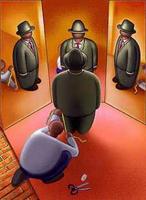 What an odd word. OK, I don't know everything, and I thought I spoke English, but I certainly missed that word as an adjective. I see a website that says it is designed with a "bespoke front end". And they don't seem to be talking about the past tense of "bespeak". So I suddenly think I've missed some kind of new technology I should know about. A search on "bespoke" brings up a bunch of web design companies that say they do it, but not what it is. OK, "bespoke web design", about 30 matches down in Google, somebody finally admits that it means a custom website. Meaning, eh, a website built to somebody's specifications. I suppose that is contrasted to selling somebody a website that isn't to their specifications. Anyway, it must be a British word. Webster's dictionary clears up for me that it is a word used about clothes that is made to individual order. Tailoring. One can be a "bespoke tailor", when one makes clothes to somebody's order, rather than just adjusting what people have bought in a store. OK, I'll try to get used to it. "Well met, my lord, pray thee, let me be thy bespoke web design bloke!" What an odd word. OK, I don't know everything, and I thought I spoke English, but I certainly missed that word as an adjective. I see a website that says it is designed with a "bespoke front end". And they don't seem to be talking about the past tense of "bespeak". So I suddenly think I've missed some kind of new technology I should know about. A search on "bespoke" brings up a bunch of web design companies that say they do it, but not what it is. OK, "bespoke web design", about 30 matches down in Google, somebody finally admits that it means a custom website. Meaning, eh, a website built to somebody's specifications. I suppose that is contrasted to selling somebody a website that isn't to their specifications. Anyway, it must be a British word. Webster's dictionary clears up for me that it is a word used about clothes that is made to individual order. Tailoring. One can be a "bespoke tailor", when one makes clothes to somebody's order, rather than just adjusting what people have bought in a store. OK, I'll try to get used to it. "Well met, my lord, pray thee, let me be thy bespoke web design bloke!"
Ah, here's an article that explains well what bespoke web design implies and how it fits in historically. The idea is that one size doesn't fit all. I.e. it isn't necessarily good enough for you to just use some ready made template, or to just rip off Yahoo's look. And the idea is also that you might not be able to make a good site by yourself, even if you have Dreamweaver or Frontpage. So, it is a setup for telling you that, if you really want a website you'll be very happy with, and that fits your unique circumstances, requirements and goals - you need to hire a professional to do a custom job for you."I call this the "Bespoke" period of Web design, named for the time-honored, English process of hand-tailoring suits based on the customer's individual characteristics and needs. Done right, the suit fits like a glove and lasts a lifetime – or until the waistline needs to be altered." OK, so find a real professional, in other words, who'll listen to what you want, take your measures, work for a month, and come back with a product that fits you perfectly. Which will cost you a hefty penny, but you'll feel good wearing it for years.
The only problem I'm having with it is that most of the websites I could find, used as examples by bespoke web design companies, DO look like templates, even if they maybe aren't. But then again, tailor-made suits don't look noticably different from other suits, other than that they fit their owner.
[ Culture | 2004-04-15 11:16 | | PermaLink ] More >
|
|
|
|
 News item about a substance, NOVEC 1230, that looks like water and acts somewhat like water, except for that it isn't wet, and anything you submerge into it doesn't get wet. This company uses it for firefighting purposes, and apparently it was developed by 3M. You can sprinkle it out over computers and papers and everything, and it puts out fire as well as water, but the items don't get damaged. As a matter of fact, you can apparently drop a book or a running computer into the stuff, and the book doesn't get wet, and the computer keeps running. News item about a substance, NOVEC 1230, that looks like water and acts somewhat like water, except for that it isn't wet, and anything you submerge into it doesn't get wet. This company uses it for firefighting purposes, and apparently it was developed by 3M. You can sprinkle it out over computers and papers and everything, and it puts out fire as well as water, but the items don't get damaged. As a matter of fact, you can apparently drop a book or a running computer into the stuff, and the book doesn't get wet, and the computer keeps running.
Give us some cool pictures, dammit. Looking at those company websites makes it sound much more boring.
[ Science | 2004-04-15 11:51 | | PermaLink ] More >
|
|
| Wednesday, April 14, 2004 |  |
|
|
|
 Via Quotes of the Day: Via Quotes of the Day:
"Reality is that which, when you stop believing in it, doesn't go away."
- Philip K. Dick
Yeah, that's a good way of putting it.
That would exclude, oh, how about governments and countries? If we don't believe in boundaries and in the power of certain groups of people to govern us, then there really isn't anything there. There are continents and land and people. But no borders and no power over us. No laws either. They aren't really real. People are real. What they do is real. Their thoughts and feelings and actions are real.
Goodbye to religions too. If you don't believe in them, there's really not much there. A lot of church buildings and some books. Good deeds are real.
Scientific laws and theories go away as well when we stop believing in them. Nature and life doesn't go away. The flowers keep blooming and the planets keep rotating around their stars. And there's a system to that, which keeps working. But it is the theoretical models of how we think that works that drop away.
There's a lot of things our theories say don't exist or can't exist. If we stop believing in those theories, those things will still be there. Extraterrestrials, other dimensions, paranormal perceptions, miraculous events. Except that they won't be miraculous or paranormal unless you have some kind of belief about how unlikely they're supposed to be.
Dreams exist whether you believe in them or not. You'll be zipping around in fantastic realities every day, at least when you sleep.
Failure and success, loyalty and betrayal, mistakes, lies, obligations, promises, shoulds - none of it means much if one stops believing. What matters is what is there, and what you actually do. Good constructive actions last longer than destructive actions. They're more real. Good and bad feelings exist. The reasons for them do not.
Life exists. Consciousness exists. I exist. I'm probably more real the more I get over my beliefs about why and how.
[ Thoughts | 2004-04-14 10:13 | | PermaLink ] More >
|
|
| Tuesday, April 13, 2004 |  |
|
|
|
 BBC, via Marc's Voice: A Matrix Online game is being released that includes built-in AOL Instant Messaging. That means that anyone with AIM, ICQ or iChat will be able to receive messages from inside the game in real time. BBC, via Marc's Voice: A Matrix Online game is being released that includes built-in AOL Instant Messaging. That means that anyone with AIM, ICQ or iChat will be able to receive messages from inside the game in real time.
Nothing technically very remarkable about that, but it is somehow intriguing. Links between virtual and real worlds. Of course one can take it further, to be able to make voice or video calls between a virtual world and the normal tools on my desktop. Would I then be looking at an avatar in the middle of chasing a monster?
Reminds me of AlphaWorld 8 years ago, where I was trying to figure out how to create meaningful links with the outside world. One could use outside graphics files to paste on signs and virtual screens. So I could make "fake" graphics files that ran a program on my server, which would IM me that somebody just came by and looked at my building. And I could of course have made the picture show some dynamically generated information in return.
[ Technology | 2004-04-13 19:19 | | PermaLink ] More >
|
|
|
|
From Mopsos:Felix Oberholzer of the Harvard Business School and Koleman Strumpf of UNC Chapel Hill just completed an extensive empirical analysis of p2p sharing which concludes thatDownloads have an effect on sales which is statistically indistinguishable from zero. Now that's interesting. Is the battle for IP protection based on false assumptions? Could it be after all about maintaining a status quo, so that intermediates who used to provide a valuable service before P2P technology existed can still make money even though the value of the service they provide has reduced dramatically? Could it be? Maintaining the status quo? Why would the music industry do such a thing? Because they in danger of going extinct, that is, and their model no longer makes sense. It is close to being a lie that file sharing hurts their sales. The analysis figured that maybe 5000 file sharing downloads might make one of them decide not to buy a CD. And other studies show that file sharing in many cases increase sales, making people buy a CD they wouldn't have been aware of without file sharing.
[ Information | 2004-04-13 19:19 | 0 comments | PermaLink ]
|
|
| Sunday, April 11, 2004 |  |
|
|
|
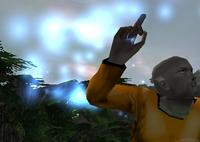 Project Entropia is a new online multiplayer VR universe. There are a bunch of those already, with many users. But now see this Business Model. Several of the others have economies where one can buy and sell items for some internal virtual currency. But in this one they go a bit step further. One can convert the currency back and forth from normal currencies, like dollars and euros. And people can set up businesses inside the world. There's a stock market, there are casinos, there are stores, you can buy a house. Most everything is for sale, or is convertible to real money. So, if you find a hidden treasure, you can go and cash it out. Project Entropia is a new online multiplayer VR universe. There are a bunch of those already, with many users. But now see this Business Model. Several of the others have economies where one can buy and sell items for some internal virtual currency. But in this one they go a bit step further. One can convert the currency back and forth from normal currencies, like dollars and euros. And people can set up businesses inside the world. There's a stock market, there are casinos, there are stores, you can buy a house. Most everything is for sale, or is convertible to real money. So, if you find a hidden treasure, you can go and cash it out.
My son Zach, who's quite a veteran in some of these games, told me about it. He and some of his friends were plotting how they could finance their playing of the game. The game itself is free, but you need some cash for buying things you need in the start. If you're successful, you might become self-sustainable later of course. But now they were exploring money making ideas they could find elsewhere on the net, like being paid for looking at ads.
Maybe this kind of thing just becomes another clever way of relieving subscribers of their money. Or this kind of virtual/non-virtual economy starts something new that somehow is meaningful. If nothing else, making teenagers think like entrepreneurs.
If the economy is a little slow in the meat world, and there's unemployment and prices are rising - can you then drop into a virtual world and start creating value there instead, and feed that back into the real world? It's an idea.
[ Culture | 2004-04-11 09:32 | | PermaLink ] More >
|
|
|
|
 Nova Spivack: Nova Spivack:New software can figure out where you are positioned based on analyzing a photo in near real time. Simply send it a photo from your camera-phone and the software will match the image to a database of locations -- such as buildings in a city -- and give you back your coordinates. The software is potentially more accurate than GPS. That's cool and interesting of course. But would I pay for it? Or even bother to go through the steps of taking a photo and e-mailing it? Probably not. If it were all automatic and free it would be a different matter. If an always-on camera continously was scanning my surroundings and could tell where I am and what I'm looking at, that might be something. And then I'd probably have more use for a device that did it with faces. E.g. I go to a convention and it would tell me which people I already know, but have forgotten.
[ Technology | 2004-04-11 18:18 | | PermaLink ] More >
|
|
| Saturday, April 10, 2004 |  |
|
|
|
 This is a picture of Place Capitole in Toulouse from the air. This is a picture of Place Capitole in Toulouse from the air.
And here is a Quicktime VR 360 degree image from down on the square.
Now, when are we going to see more live Quicktime VR for webcams? Should that really be that hard? Regular webcams are nice, but I'd love to drop in and visit the cities of the world in a 360 degree format, where I can turn around and zoom in, and see what is actually there now. Is it because the cameras are so expensive? Like, $28,000 for a camera that can do 360 degrees in one movement in 14 seconds. Can be done much cheaper of course.
Actually there are a few live Quicktime VR cameras. Here's one of a beach in Australia. But not much.
[ Culture | 2004-04-10 10:08 | | PermaLink ] More >
|
|
|
|
 When we first were staying in a hotel in Toulouse I tried to find out who might have WiFi, so I could connect up my computer. I found only one that mentioned "sans fil" (wireless) broadband access. But, hahah, when we got to the room, I realized that the wireless part was a keyboard that connected with the TV wirelessly. And the TV indeed provided Internet access, but at something like 20 euros per hour. When we first were staying in a hotel in Toulouse I tried to find out who might have WiFi, so I could connect up my computer. I found only one that mentioned "sans fil" (wireless) broadband access. But, hahah, when we got to the room, I realized that the wireless part was a keyboard that connected with the TV wirelessly. And the TV indeed provided Internet access, but at something like 20 euros per hour.
Now it seems to look a lot better. Here's a list of hotspots in Toulouse. Maybe only the ones that use the Intel hardware, I'd guess, but at least there are a bunch. All of which are the more expensive hotels. To the tune of 8 euros per hour.
When later I was waiting for by DSL connection, I once drove around looking for open WiFi access. And after a while managed to park in front of some school that had an open network, to check my e-mail.
WiFi Toulouse is a little grassroots group that is hoping to have more free access points. For a list they point to JWire, which, however, have none listed for Toulouse. Not that I need it at this point, but it would be a good thing.
[ Technology | 2004-04-10 10:21 | 0 comments | PermaLink ]
|
|
|
|
 It has been posted widely, but it is a good story, so let me mention it too. This lady lives in the Ukraine and rides a big Kawasaki. One of her favorite excursion targets is the "dead zone" around the site of the Chernobyl nuclear disaster. Nobody lives there, and there's nobody around for miles and miles and miles. It is a ghost town that looks exactly like it did 20 years ago, a frozen snapshot of Soviet era life, just without the people. It has been posted widely, but it is a good story, so let me mention it too. This lady lives in the Ukraine and rides a big Kawasaki. One of her favorite excursion targets is the "dead zone" around the site of the Chernobyl nuclear disaster. Nobody lives there, and there's nobody around for miles and miles and miles. It is a ghost town that looks exactly like it did 20 years ago, a frozen snapshot of Soviet era life, just without the people.
The trick is that on the asphalt in the middle of the road, the radiation level isn't bad. Go to the side of the road and it doubles. One meter away from the road and it is 4-5 times higher. So, if you stay moving on your bike, and you go alone, without anybody else to turn up dust, and you bring your geiger counter, you're probably alright.
Not that it is anything to take lightly. The whole area will not be fit for human habitation for another 600 years or so, and it will have heightened radiation for around 48,000 years.
And don't forget, many people died from the radiation released here. There are no good official numbers, but it might well have added up to several hundred thousands.
[ Culture | 2004-04-10 11:01 | | PermaLink ] More >
|
|
| Friday, April 9, 2004 |  |
|
|
|
 Lilia Efimova on "From creative mess to products (blogs and wikis for thinking)" Lilia Efimova on "From creative mess to products (blogs and wikis for thinking)"
"Thinking of blogs vs. wikis to support thinking. For me blogging is easier - it shows how ideas unfold over time and somehow I don't have a problem when I create new page (I do think twice in wikis - because it increases navigation mess). Blogging is also about permalinking and hypertexting half-baked ideas...
The problem is that at the certain moment there is a critical mass (critical mess ;) of bits related to a theme. At this moment you need a least an overview of all of them and then a way to construct something more coherent. Wikis are great for that. It's much easier to get an overview of ideas (if they collected on one page :), edit them into something better or even go for refactoring the whole thing.
But then you get the clarity of a final product and lose an overview of path that took you there. And I'm getting more and more convinced that process and artefacts on the way is as important as the final product." I myself haven't so far really gotten into Wikis. Even though I'm missing a place to put subjects together in a more coherent way. Blogs work really well for me to write in, exactly because I don't have to think of where something fits or where I'm going with it or even if it is a complete thought. It is a somewhat divergent tool. Happily goes in many directions. But also keeps a linear record, and is a unified pool to find things in later. But then I'd also like convergent tools. Tools that help me make things come together into more clear and complete ideas, more full projects, functional spaces for collaboration, etc. I'm not sure Wikis automatically facilitate that, although they can of course. They can be whatever one makes them. Including something that goes off into a zillion directions and where one can't easily find the pieces again. Or focused spaces where one or more people keep refining what they know.
Then about "process and artefacts on the way". More channels, in part. And ways of stepping through what happened, along various dimensions, most significantly chronologically. A blog shows things that happen (are posted) chronologically, and it includes credits of where posts come from, or what they respond to. Which other tools like Technorati can come and catalog. But it probably doesn't show us the whole process of how the posts come about. Wikis keep track of successive changes, i.e. revisions of pages, but I'm not sure anybody uses that to chart the process of increased value accummulation.
Need tools that can better implement guiding patterns. A blog is one pattern, of a continous stream. A wiki is a free-form format where you can come up with your own pattern, but it is hard to guide it. Other tools might provide gentle guidance that inspires certain things to happen, and that include sufficient tracking of how it happens, to be able to examine the process after the fact or along the way.
[ Knowledge | 2004-04-09 09:53 | | PermaLink ] More >
|
|
|
|
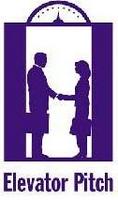 Remember to send in your submission for the ‘Perfect’ Corporate Weblogging ‘Elevator Pitch’ Competition. Remember to send in your submission for the ‘Perfect’ Corporate Weblogging ‘Elevator Pitch’ Competition.A business executive, with whom you have been trying to arrange a meeting, is available for a condensed pitch from you on a one minute elevator ride.
It is your goal to convince this attentive business leader — who has heard about weblogs — to sponsor and resource a critical mass of weblogs in his/her organization so that their benefits can be demonstrated in a meaningful way. 50 to 160 words. The deadline is April 15th.
[ Information | 2004-04-09 09:58 | | PermaLink ] More >
|
|
|
|
 Also posted at FutureHi. Also posted at FutureHi.
A group of creative futurist thinkers tried to imagine the year 3000 within the framework of a conversation. It is somewhat interesting, I think, but mostly because the results are rather pathetic. Despite trying not to, they mostly end up imagining a little more of the same. As they mention, the people in the year 1000 would have made completely ridiculous predictions of the year 2000. They probably didn't even have a concept of "progress". Now, at least, we expect that lots of things will change in the future. But we have a hard time getting over just imagining a gradual evolution of the things we know. How would government be changed, and economy, and education, and shopping? Who says we'll have any? Anyway, one of the better statements from that conversation is this one from Bart Kosko:"What is Heaven? Heaven's a place where you can create worlds at will, and the ideal Heaven is where you run the whole thing yourself. The current means of getting to Heaven involve various supernatural systems for which, at this point, there's no scientific evidence. So I think we can reduce Heaven to an engineering project, which we're doing. The demand for Heaven is great--witness the desire of every human heart, from the people who built the ancient pyramids to modern society, to live beyond one's biologically allotted time. Our plan is ultimately to transfer human consciousness from the brain to bits of information in a computer chip, or some other kind of computational medium, so that just by thinking--that act of volition--we'll be able to create our own personal world. And I think the first stage of Heaven will be the sensory world, and beyond that I think we'd hit a higher, spiritual plane. Despite that I think that the project of transferring human consciousness into a computer chip is silly and misguided, I think he's got a good angle on it.
What will make all the difference is the disruptive events and technologies. I think there will be a whole number of those way before the year 3000, each of which will change everything. Like:
Open extraterrestrial contact. Thinking that extraterretrials are only folks we might meet once we've painstakingly developed intrastellar travel after hundreds of years is a little naive. They might well show themselves much earlier in the game. And nothing will be the same once we're dealing openly with races that are millions of years ahead of us in development. I'd guess we'd have joined the galactic federation long time before the year 3000.
Self-replicating nano-tech. If we can construct anything material simply by laying out the blueprint of how to make it, that changes everything. All stuff will be free, for one thing, and economy as we know it is no longer meaningful. Neither will a lot of the struggles we now have with the environment.
Multiple Parallel Universes. Once we realize conclusively and demonstrably that there are multiple versions of our universe, a close to infinite amount, and we can actually interact with them - everything changes. Quantum Physics is no longer just a bizarre, but interesting set of equations that theoretical physicists can play with.
Conscious Collective Intelligence. What if and when we realize conclusively that there are higher orders of intelligence than ours. My bet is not on artificial intelligence, but on the manifestation of collective natural intelligence. E.g. we discover that humanity has an intelligence that is way beyond our individual intelligences, but which includes all of our minds. And that intelligence starts acting more noticably and decisively. We can't quite think of ourselves the same after that. The Internet might possibly supply the initial wiring that helps this happen.
Virtual Reality more real than Material Reality. One way or another we'll develop immersive virtual reality that we can step into and which addresses all of our senses. The Holodeck. It might involve direct connections with our neurology and our brains, or it might be done with projections and sensory feedback on the outside. Either way, it will change our society dramatically if it suddenly is possible and practical for lots of people to live most of our life within virtual realities of our choice.
Information Singularity. At some point it becomes quite trivial to record everything that ever happens to everybody, and all meta-data that anybody can imagine applying to anything, and to make it thoroughly indexed and instantly available to anybody who needs it. It might no longer be meaningful to "search" for anything, or to keep secrets, or to pretend that things are any different from what they are, because anybody can check in an instant.
All of these are pretty much already on the program, and I'd expect them within the next 100 years, not the next 1000. And there are of course lots of things I might not even imagine, which will change everything even more. It is by its very nature very hard to predict surprisingly disruptive events. Even more so, a sequence of disruptive events, building upon one another.
There's a political and economical battle which will play out as to who should control all of this. We currently live in a political and economical system that will encourage and assist and reward certain people in power positions for keeping all of these things under their own exclusive control, and for keeping the rest of us in a more old-fashioned world that is manufactured by these very same technologies. Along the lines of "The Matrix". I.e. they might be the ones who make business deals with the extraterrestrials, and who will zip around in private hyperspace crafts, and who will keep the rest of us living in an immersive virtual reality where everything is pretty much the same, just a little fancier, where we still go to work and make money and watch TV and vote in elections, while they keep our every move monitored and catalogued and profiled.
The more important thing that needs to happen way before the year 3000 is something that is neither a technological change nor an external event. We as a species and as individuals need to realize where the real power is. We need to experience a grassroots revolution of consciousness where we discover without a shadow of a doubt that all the power in society comes from us, and that we're free to create something better, rather than just going along with what is presented to us. We need to go through a kartharsis, a transformation, after which it will be impossible for any small elite to control the rest of us by owning the information or the secret knowledge or the technology or the media. There's plenty of movement towards that in the mindsphere of the Internet at this point, but it is not nearly enough. It is hard to say exactly how it will look or how it will work. If we play our cards well and we wake up at the right time, and we figure out how to work together, a paradise of our own making will be ours, where wonders beyond belief are the routine of life. If we don't get it, or we're too late, we'll notice some day that we somehow only ended up with more of the same, and somebody else holds all the cards, and the cards are so powerful that we no longer have any opportunity for changing the system.
There's a window of opportunity that probably isn't all that large. It is an opportunity to evolve, individually and collectively, to be able to deal with a totally different world, as conscious and free and connected beings. The change will probably be within us, a psychological or spiritual change, but its emergent manifestation will be in the way we will be able to network and self-organize and collaborate on a wide scale. It is a matter of considerable urgency.
[ Patterns | 2004-04-09 17:27 | | PermaLink ] More >
|
|
| Thursday, April 8, 2004 |  |
|
|
|
 Via SmartMobs, check out Collective Proza: Via SmartMobs, check out Collective Proza:You know this game where everybody gets to add one sentence to a story? Well, here's the online version. In order to make it a little bit more interesting and protect the concept a bit from abuse, each visitor can contribute one candidate sentence. When there are four options, a vote starts and the first one with two more votes than the others gets added. Repeat.
The story so far:
Whether it was a good idea to go back into the woods, I still don't know. However, the events of that day taught me never to trust advice given in haste. My fate was sealed by people quick of opinion yet hollow of concern, and my only consolation was the belief that they would truly meet their reckoning that day...if not by my hand then by that of the Beast. And then I remembered, "If it wasn't for my horse, I would not have spent that last year in college."
I was walking slowly, looking in every direction, listening carefully - was someone there, in the thick of the woods? Darkness was falling softly but fast and soon the shades of the trees were not distinguishable from those of other creatures anymore. I had to find the cabin I had left early in the morning - I had to find it before I was found. That's not half-bad. I'm not sure we'll write the declaration of independence that way. But it might be a good way of releasing some creativity and arriving at a story that nobody had expected.
I get to think of an excellent improv game where people in a circle take turns adding just the next word to a story. That's actually more fun. What is interesting about it is that it brings up the censors in our mind. We're usually rather afraid of just handing out the instant answer that our sub-conscious comes up with. But the story gets much more interesting once we get over that and give the subconscious answer without hesitation.
[ Inspiration | 2004-04-08 07:33 | 0 comments | PermaLink ]
|
|
|
|
 On the previously mentioned subject of "naked sushi", a Japanese restaurant in the conservative Chinese city of Kunming has gotten in a bit of trouble from offering a promotional "feast on a beauty's body" for local journalists. On the previously mentioned subject of "naked sushi", a Japanese restaurant in the conservative Chinese city of Kunming has gotten in a bit of trouble from offering a promotional "feast on a beauty's body" for local journalists.Known as "Nyotai Mori" in Japan, the feasts date back to ancient times and are often offered in special hotspring resorts today, but are generally left off menus. They are offered to aficionados on request. Yeah, maybe its wiser to leave it off the menu, if the local community doesn't exactly love the idea. Not that it is any of their business. Anyway, here's a French page that explains in quite some detail how it is done correctly. You need a virgin, for one thing.
[ Culture | 2004-04-08 09:02 | | PermaLink ] More >
|
|
|
|
 An interpretation of the Tao Te Ching, via Bird on the Moon: An interpretation of the Tao Te Ching, via Bird on the Moon:"If you can talk about it, it ain't Tao.
If it has a name, it's just another thing.
Tao doesn't have a name.
Names are for ordinary things.
Stop wanting stuff. It keeps you from seeing what's real.
When you want stuff, all you see are things.
These two statements have the same meaning.
Figure them out, and you've got it made." And, no, it is not me translating it, even though it says "stuff" several times. Some people think I say "stuff" and "things" way too much. And stuff.
[ Knowledge | 2004-04-08 09:05 | | PermaLink ] More >
|
|
| Wednesday, April 7, 2004 |  |
|
|
|
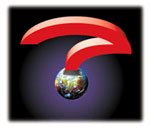 Via Dave Pollard. Edge asked a bunch of smart people for their personal laws. You know along the lines of Murphy's Law, Moore's Law, Metcalfe's Law and that kind of thing. Answers are here. These are some of my favorites: Via Dave Pollard. Edge asked a bunch of smart people for their personal laws. You know along the lines of Murphy's Law, Moore's Law, Metcalfe's Law and that kind of thing. Answers are here. These are some of my favorites:Art Kleiner: Every organization always operates on behalf of the perceived needs and priorities of some core group of key people. This purpose will trump every other organizational loyalty, including those to shareholders, employees, customers, and other constituents.
Stuart Hameroff:The sub-conscious mind is to consciousness what the quantum world is to the classical world.
Sara Lippincott: God is evolving. So if you're an atheist, you'd better hope that the arrow of time only goes in one direction.
Steven Levy: The truth is always more interesting that your preconception of what it might be.
Matt Ridley: Science is the discovery of ignorance. It is not a catalog of facts.
George Lakoff: Frames trump facts. All of our concepts are organized into conceptual structures called "frames" (which may include images and metaphors) and all words are defined relative to those frames. Conventional frames are pretty much fixed in the neural structures of our brains. In order for a fact to be comprehended, it must fit the relevant frames. If the facts contradict the frames, the frames, being fixed in the brain, will be kept and the facts ignored.
Ray Kurzweil: (The Law of Accelerating Returns) Evolution applies positive feedback in that the more capable methods resulting from one stage of evolutionary progress are used to create the next stage. Each epoch of evolution has progressed more rapidly by building on the products of the previous stage.
Frank Tipler: (Tipler's Law of Unilimited Progress) The laws of physics place no limits on progress, be it scientific, economic, cultural, or intellectual. In fact, the laws of physics require the knowledge and wealth possessed by intelligent beings in the universe to increase without limit, this knowledge and wealth becoming literally infinite by the the end of time. Intelligent life forms must inevitably expand out from their planets of origin, and convert the entire universe into a biosphere. If the laws of physics be for us, who can be against us?
W. Daniel Hillis: The representation becomes the reality. Or more precisely: Successful representations of reality become more important than the reality they represent. Examples: Dollars become more important than gold. The brand becomes more important than the company. The painting becomes more important than the landscape. The new medium (which begins as a representation of the old medium) eclipses the old. The prize becomes more important than the achievement. The genes become more important than the organism. OK, I've gotta stop. Read them yourself. It is a good exercise to boil big complicated phenomena down into simple laws and princples, I think. Even if you don't quite agree, you at least find that out faster.
Damn, I gotta think of some good law myself. Except for that "Funch's Law" sounds a little clumsy.
[ Patterns | 2004-04-07 14:08 | | PermaLink ] More >
|
|
|
|
 This is a photo mosaic of George W Bush, constructed of pictures of Americans who have died in Iraq since the same self-proclaimed "war president" entered office. I guess they didn't have time to include the 20 or so who died in the last 24 hours. This is a photo mosaic of George W Bush, constructed of pictures of Americans who have died in Iraq since the same self-proclaimed "war president" entered office. I guess they didn't have time to include the 20 or so who died in the last 24 hours.
[ Politics | 2004-04-07 15:25 | | PermaLink ] More >
|
|
<< Newer stories Page: 1 ... 37 38 39 40 41 ... 97 Older stories >> |
|

This is a collage of things that catch my eye, things that need to be said, and stuff I really care about
TRUTH
BEAUTY
FREEDOM
LOVE
TECHNOLOGY
|
| Mon | Tue | Wed | Thu | Fri | Sat | Sun |
|---|
|
|
|
|
|
|
1 |
| 2 |
3 |
4 |
5 |
6 |
7 |
8 |
| 9 |
10 |
11 |
12 |
13 |
14 |
15 |
| 16 |
17 |
18 |
19 |
20 |
21 |
22 |
| 23 |
24 |
25 |
26 |
27 |
28 |
|
|




